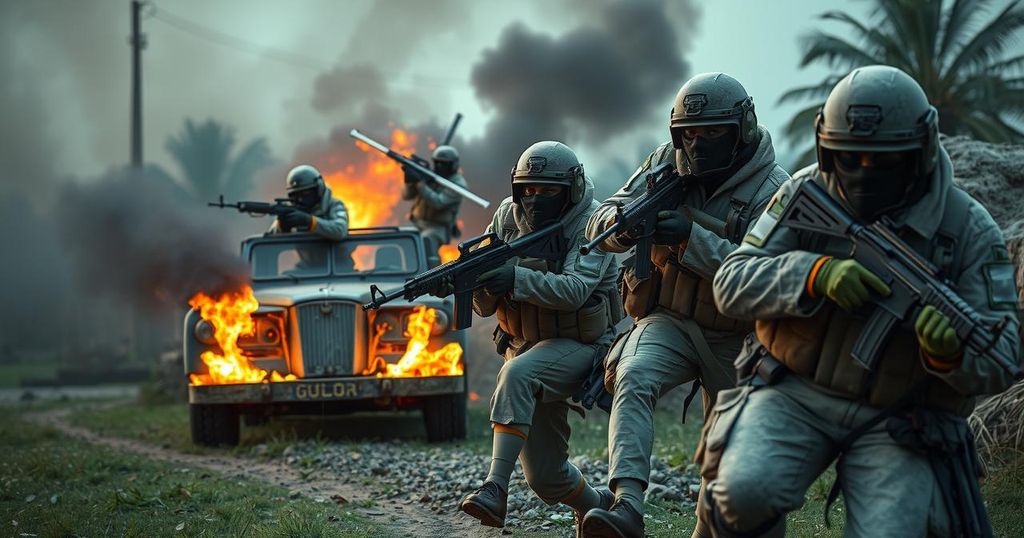The M23 conflict in eastern DRC has escalated due to significant military advances by the rebel group, which claims to protect the Congolese Tutsi community from discrimination. Led by Bertrand Bisimwa, the M23 characterizes its fight as an existential war, while the DRC government regards it as a major security threat. Efforts for peace have largely failed, with ongoing humanitarian crises despite calls for dialogue.
The ongoing conflict in eastern Democratic Republic of Congo (DRC) has experienced significant escalation, primarily between the DRC government forces and the M23 rebel group. Bertrand Bisimwa, head of the M23 political wing, characterizes their struggle as an “existential war” aimed at safeguarding the Congolese Tutsi population, alleging that they face systemic discrimination linked to their Rwandan heritage. Since its resurgence in 2022, the M23 has expanded its territorial control in North Kivu, which has resulted in a humanitarian crisis characterized by the deaths of hundreds and the displacement of nearly two million individuals.
Despite various attempts at establishing peace, such as the Nairobi process initiated in 2022 and mediation efforts led by Angola, tangible progress remains elusive. The M23’s recent military advances further muddle the situation. Bisimwa asserts that their actions are rooted in self-defense against government offensives, claiming, “We cannot be blamed for defending ourselves… The logic of war dictates that when you have supremacy, you take the space from which they were shooting at you.”
The DRC government perceives the M23 as a critical security threat, further exacerbated by widespread international allegations of Rwandan support for the rebels, a claim that Kigali staunchly denies. Bisimwa refutes criticisms of territorial expansion by the M23, emphasizing their commitment to protecting their dominion and facilitating the return of displaced families, which has reportedly occurred for over 480,000 individuals in their controlled territories. He highlights the responsibility of the state to care for all citizens, stating, “They are not second-class citizens. The state must take care of them.”
Conversely, the DRC government has maintained a firm refusal to engage in dialogue with the M23, labeling them as a Rwandan proxy. In response, Bisimwa has criticized this stance, asserting, “War cannot solve our problems. Dialogue alone can address the root causes of the conflict.” Furthermore, the M23 faces allegations of collusion with other armed groups and the exploitation of natural resources, which Bisimwa seeks to counter by emphasizing the group’s dedication to governance and the protection of local communities, including their initiatives to secure Virunga National Park.
Ultimately, while the situation remains dire, Bisimwa reiterates the M23’s aspiration for a peaceful resolution through dialogue, insisting, “If Kinshasa cannot solve our problems, it should let us solve them ourselves.”
The escalation of conflict in eastern DRC involves historical ethnic tensions, particularly concerning the Tutsi population and its ties to Rwanda. M23, which initially emerged from a mutiny in the Congolese army in 2012, symbolizes a faction battling for the rights of Congolese Tutsis amidst ongoing regional instability. Humanitarian repercussions accompany the military action, resulting in widespread displacement and fatalities. International dynamics further complicate the regional conflict, with allegations of external support for the rebel faction exacerbating tensions.
The conflict in eastern DRC continues to escalate, driven by the actions of the M23 and the refusal of the DRC government to engage in dialogue. As the M23 claims an existential fight for the protection of the Tutsi community, the humanitarian impact of the conflict intensifies. Efforts towards mediation and negotiations have largely proven ineffective, underlining the complex interplay of local, national, and international forces shaping the region’s future. The need for peaceful resolutions through dialogue remains critical as violence escalates.
Original Source: eastleighvoice.co.ke






